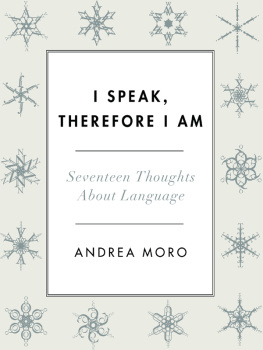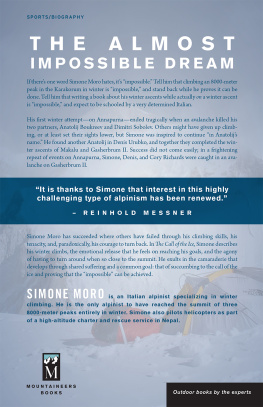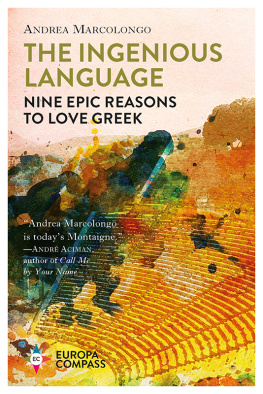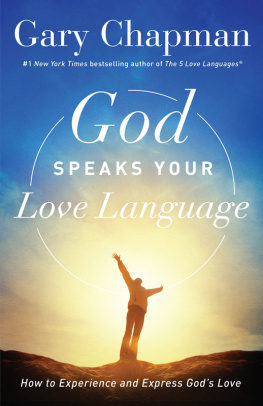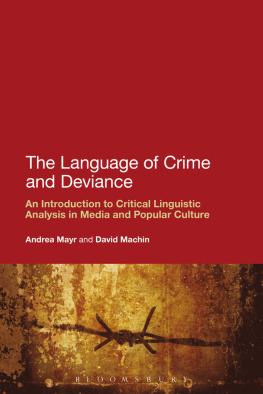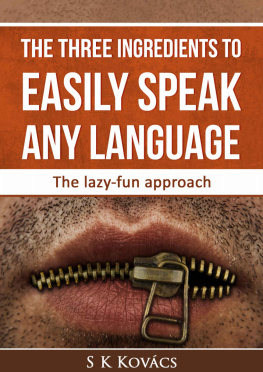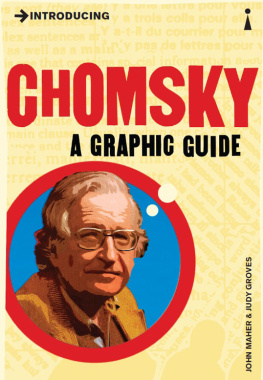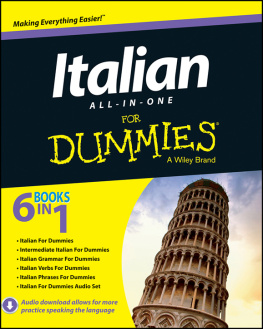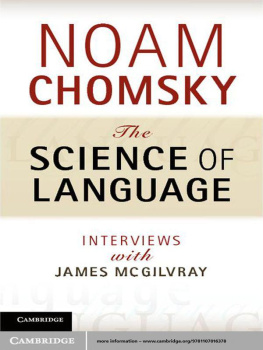Table of Contents
I SPEAK, THEREFORE I AM
I SPEAK, THEREFORE I AM
Seventeen Thoughts About Language
ANDREA MORO
Translated from the Italian by Ian Roberts
COLUMBIA UNIVERSITY PRESS NEW YORK
Columbia University Press
Publishers Since 1893
New York Chichester, West Sussex
cup.columbia.edu
Copyright 2016 Andrea C. Moro
All rights reserved
E-ISBN 978-0-231-53392-8
Library of Congress Cataloging-in-Publication Data
Names: Moro, Andrea, author. | Roberts, Ian, translator.
Title: I speak, therefore I am : seventeen thoughts about language / Andrea Moro;
Translated from the Italian by Ian Roberts.
Other titles: Parlo dunque sono. English
Description: New York : Columbia University Press, [2016] | Translated from Italian: Parlo dungue sono, 2012. | Includes bibliographical references. | Description based on print version record and CIP data provided by publisher; resource not viewed.
Identifiers: LCCN 2015045115 (print) | LCCN 2015040186 (ebook) | ISBN 9780231533928 (electronic) | ISBN 9780231177405 (cloth : alk. paper) | ISBN 9780231177412 (pbk.)
Subjects: LCSH: Language and languagesPhilosophy.
Classification: LCC P106 (print) | LCC P106 .M66513 2016 (ebook) | DDC401dc23
LC record available at http://lccn.loc.gov/2015045115
A Columbia University Press E-book.
CUP would be pleased to hear about your reading experience with this e-book at .
Cover design: Phil Pascuzzo
Break what break will! My mind abideth strong
To know the roots, how low soeer they be,
Which grew to Oedipus.
There is my lineage true, which none shall wrest
From me; who then am I to fear this quest?
Sophocles, Oedipus the King, ll. 1076ff.
CONTENTS
Choice, Then Order, Then Chance, Finally Only Light
As any photographer knows, it takes hundreds, even thousands, of tries just to get one shot thats right. Thats if everything goes well; sometimes, through dissatisfaction with a shot or an exposure that just cant capture that special moment, you just throw everything out. And then when the right photos have been chosen and put together in an album, you realize that the order in which theyre placed makes a difference: a group of people sitting around a table followed by an empty mountain road means something different from an empty mountain road followed by a group of people sitting around a table. Maybe we cant quite say what it is, but we know theres a difference. Also, sometimes the best photo is the one taken by accident: all those carefully prepared, carefully worked-out efforts that were supposed to be masterpieces get thrown out, while just that one, taken by chance, may happen to capture that particular light or fix on that particular movement that alone make us relive a whole story.
Choice, then order, then chance: making a good photo album is really like doing science, because doing science, or doing it well, involvesand has to involveall aspects of life. Science that tells us nothing about ourselves is useless, like a badly put-together photo album. And if we study language scientifically, it is impossible that we wont learn something about ourselves (unless we try not to), because language, like theorems and symphonies, exists only in us; outside of us, there are objects, motion, and light. Constellations and symphonies are there because we are there, looking and listening. And so it is for sentences; when we study sentences, we find ourselves, in a way, in the same situation as someone who studies light. We dont actually see light, we only see its effects on objects. We know it exists because it is partly reflected by the things it encounters, thereby making visible what would otherwise be invisible. In this way nothing, illuminated by another nothing, becomes, for us, something. Words and sentences work in the same way: they have no content of their own, but if they encounter someone who listens they become something. We are part of the data.

And out of the ground the LORD God formed every beast of the field, and every fowl of the air; and brought them unto Adam to see what he would call them: and whatsoever Adam called every living creature, that was the name thereof.
Genesis 2:19
In the beginning it might seem obvious to find Him, but in fact it isnt. Because, unexpectedly, God the Creator is a God who listens. The paradox is that language, our distinguishing characteristic above all other creatures, is in the first book of the Old Testament a gift that confirms beyond any doubt our freedom and our creativity. The consequences of this are made clear. We read that God created us in His image, but no one has ever seen the face of God. So what does it mean to say that we are created in His image? This is where language comes in. Perhaps our resemblance to God can be perceived in realizing we are able to give names to things. That is, the Creator has made us in His image because He recognizes our creations; although they are made only of air and thought, they are nonetheless creations: names. And not just any names: these are the names we give to His other creations. In the Jewish tradition, the God who created Man is the same God who stops and listens to Man naming things.
This is a kind of embryonic linguisticsnames, not sentencesmaybe atomic linguistics, but linguistics nonetheless. This is because thinking of and giving a name are not trivial acts. Names, in fact, are not just conventional labels: except in a few exceptional cases, nothing tells is that a given sound is right for a given name. This is obvious if we compare different languages, but, even leaving sounds aside, names are not just freely given conventional labels. For example, look at your hand. You instinctively recognize a natural object that can be broken down into parts: palm, fingers, knuckles, nails; we also give special names to the different fingers, funny names, childish names, noble or scientific names. In every language there are names for the pieces of what we see as making up a hand. But there are no tattoos marking the borders of these pieces: the combination of the fingertip and the distal phalange of a finger is an object in the real world too. Also, it is a coherent object, in the sense that it is not made of discontinuous pieces, just like the ring finger in relation to the whole hand. The difference is that in the second case theres a special name for the object, and in the first case there isnt.
Fortunately, we dont feel a need to give names to all the combinations of pieces of the world; sometimes its convenient to invent names for certain things, but not for every possible combination of things. This is lucky, because the set of pieces of the world borders on uncountably infinite, and it would not be easy for a child to find themselves confronted with a percept of a wall made up of infinite subwalls, all of which have to be given a name. This would separate us forever from the city, because it would separate us from language, from what makes us human beings. What we need instead is a catalogue, capacious and partly elastic, but not infinite: in other words, a dictionary.
It would be good to catch our breath here, but we cant: talk of God and names leads inevitably to the endless tangle raised by the problem of His name. In the Jewish tradition, this is the

